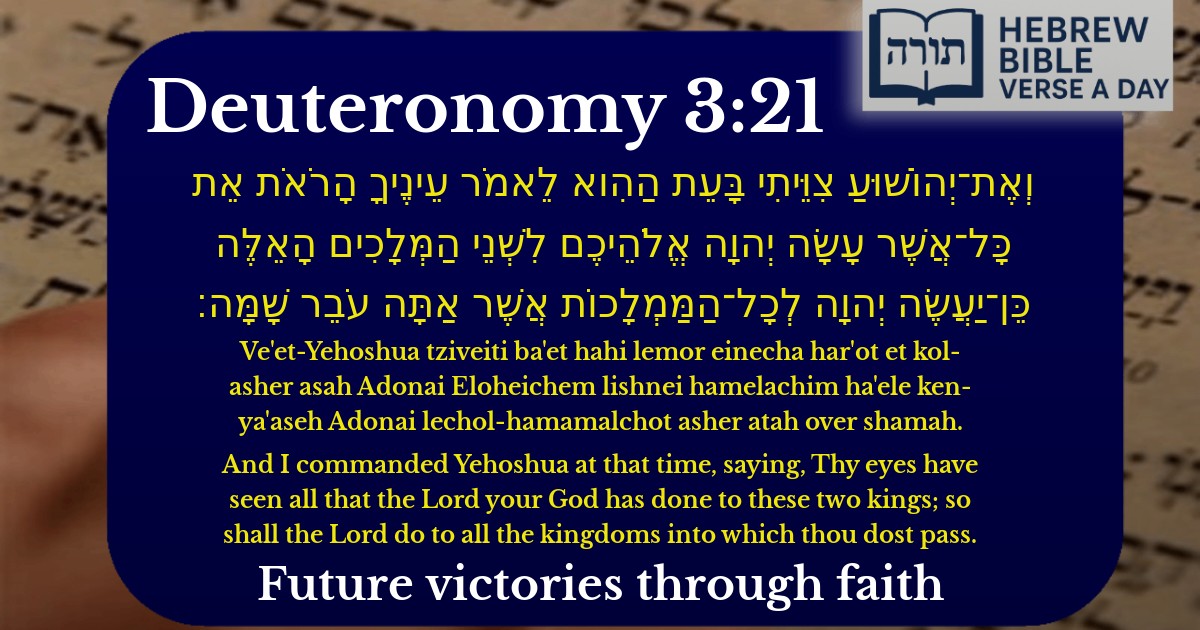Join Our Newsletter To Be Informed When New Videos Are Posted
Join the thousands of fellow Studends who rely on our videos to learn how to read the bible in Hebrew for free!
Hebrew Text
וְאֶת־יְהוֹשׁוּעַ צִוֵּיתִי בָּעֵת הַהִוא לֵאמֹר עֵינֶיךָ הָרֹאֹת אֵת כָּל־אֲשֶׁר עָשָׂה יְהוָה אֱלֹהֵיכֶם לִשְׁנֵי הַמְּלָכִים הָאֵלֶּה כֵּן־יַעֲשֶׂה יְהוָה לְכָל־הַמַּמְלָכוֹת אֲשֶׁר אַתָּה עֹבֵר שָׁמָּה׃
English Translation
And I commanded Yehoshua at that time, saying, Thy eyes have seen all that the Lord your God has done to these two kings; so shall the Lord do to all the kingdoms into which thou dost pass.
Transliteration
Ve'et-Yehoshua tziveiti ba'et hahi lemor einecha har'ot et kol-asher asah Adonai Eloheichem lishnei hamelachim ha'ele ken-ya'aseh Adonai lechol-hamamalchot asher atah over shamah.
Hebrew Leining Text
וְאֶת־יְהוֹשׁ֣וּעַ צִוֵּ֔יתִי בָּעֵ֥ת הַהִ֖וא לֵאמֹ֑ר עֵינֶ֣יךָ הָרֹאֹ֗ת אֵת֩ כׇּל־אֲשֶׁ֨ר עָשָׂ֜ה יְהֹוָ֤ה אֱלֹהֵיכֶם֙ לִשְׁנֵי֙ הַמְּלָכִ֣ים הָאֵ֔לֶּה כֵּֽן־יַעֲשֶׂ֤ה יְהֹוָה֙ לְכׇל־הַמַּמְלָכ֔וֹת אֲשֶׁ֥ר אַתָּ֖ה עֹבֵ֥ר שָֽׁמָּה׃
וְאֶת־יְהוֹשׁ֣וּעַ צִוֵּ֔יתִי בָּעֵ֥ת הַהִ֖וא לֵאמֹ֑ר עֵינֶ֣יךָ הָרֹאֹ֗ת אֵת֩ כׇּל־אֲשֶׁ֨ר עָשָׂ֜ה יְהֹוָ֤ה אֱלֹהֵיכֶם֙ לִשְׁנֵי֙ הַמְּלָכִ֣ים הָאֵ֔לֶּה כֵּֽן־יַעֲשֶׂ֤ה יְהֹוָה֙ לְכׇל־הַמַּמְלָכ֔וֹת אֲשֶׁ֥ר אַתָּ֖ה עֹבֵ֥ר שָֽׁמָּה׃
🎵 Listen to leining
Parasha Commentary
📚 Talmud Citations
This verse is not quoted in the Talmud.


Context of the Verse
This verse appears in Devarim (Deuteronomy) 3:21, where Moshe recounts his words to Yehoshua (Joshua) before the Israelites entered Eretz Yisrael. Moshe reminds Yehoshua of Hashem's miracles in defeating Sichon and Og, the two Amorite kings, as a reassurance that Hashem will similarly assist in conquering the remaining kingdoms in the Land of Israel.
Rashi's Explanation
Rashi (Devarim 3:21) emphasizes that Moshe's words were meant to strengthen Yehoshua's faith. By stating "עֵינֶיךָ הָרֹאֹת" ("your eyes have seen"), Moshe highlighted that Yehoshua personally witnessed Hashem's power, reinforcing that the same Divine assistance would accompany him in future battles. Rashi also notes that this was a tziyuni (a sign or lesson) for all future generations—trust in Hashem is built upon witnessing His past miracles.
Rambam's Perspective
In Hilchot Melachim (Laws of Kings 7:15), Rambam discusses the concept of milchemet mitzvah (obligatory war) and the role of faith in battle. This verse underscores that military success in conquering Eretz Yisrael was not dependent on human strength but on Divine intervention, as demonstrated by the defeat of Sichon and Og. Yehoshua was to lead with this awareness, ensuring the people's trust in Hashem.
Midrashic Insights
Practical Lesson for Leadership
The Kli Yakar (Devarim 3:21) explains that Moshe's directive to Yehoshua was not merely about military strategy but about spiritual leadership. A Jewish leader must internalize past miracles to inspire the people, ensuring they recognize Hashem's hand in both past and future events. This principle remains relevant for leaders in every generation.